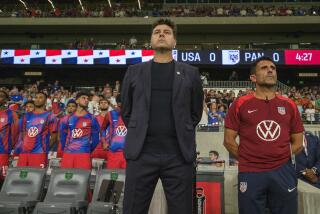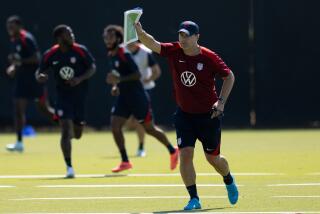World Cup: U.S. Coach Bob Bradley is a steely leader
Reporting from Pretoria, South Africa — — The moment of truth has arrived for Bob Bradley, the moment he has waited a lifetime — and especially the last four years — to experience.
Bradley is already only the fourth coach in U.S. soccer history to take a team beyond the first round of the World Cup. And he would become only the third to reach the quarterfinals if the U.S. defeats Ghana at Royal Bafokeng Stadium in Rustenburg on Saturday night.
Bob Miller did so in 1930, Bora Milutinovic matched that in 1994, and Bruce Arena accomplished the feat in 2002.
What sort of man Miller was is difficult to say, 80 years after the fact. Milutinovic was, and is, an extrovert, the Serb’s ready smile, warm welcome and shaggy locks hiding a savvy coach and shrewd tactician.
Arena, to some extent Bradley’s mentor, was wrongly perceived as haughty, an American who thought he knew as much about the sport as anyone in Europe or South America. That’s what the media and the public at first believed and they didn’t cotton to him, but it turns out Arena knew what he was doing, and still does.
If Bradley had slipped at South Africa 2010, there would have been more than a few clamoring for Arena to once again take charge of the national team. He long ago won over his critics.
But Bradley, 52, has not failed. By reaching the second round — on top of his accomplishments in winning the Gold Cup, finishing second in the Confederations Cup and coming out on top of the heap in regional World Cup qualifying — he almost certainly has secured his job for another four years.
There are no rumblings of discontent among the players and U.S. Soccer seems more than pleased with what the gaunt, shaven-headed and icy-eyed man from Montclair, N.J., has achieved.
His players, perhaps doubters at first, are now among his staunchest allies.
“Bob has a very distinct way of doing things and some people like it and some don’t,” Landon Donovan said the other day at the U.S. base camp.
“I think it’s taken a long time for a lot of us to wrap our heads around what exactly Bob wanted from us, and now we all understand why he put us through some of the things he put us through and why he challenged us the way he did.
“He could see the big picture from the beginning, while a lot of us were shortsighted.”
Instilling self-belief in his players and belief in the system has been crucial to Bradley’s success.
So, too, has been his willingness to study the sport in depth. Very few Americans watch as much soccer as Bradley does. He intently studies the game at the highest level, and knows the quirks and foibles of the leading characters, whether players or coaches.
“I think he’s right up there with the best coaches in terms of tactics,” U.S. forward Jozy Altidore said. “I haven’t been in a game where I haven’t been well-prepared going into it. He analyzes the opponent really well, the key players, what they do, their tendencies. I think he does a great job in that respect.”
Where Bradley falls down, perhaps, is in his public image, not that it concerns him very much. He comes across as too much in control of himself, too careful not to show any weakness or flaw. It’s the Princeton in him.
There are times when reporters who cover the national team wonder whether he is man or machine.
But he does have a sense of humor, he insists. And there is a twinkle in his eye when he hears or sees or says something that amuses him. He and his family live in Manhattan Beach. But all of that is off-limits, screened behind the curtain that Bradley deliberately draws across his private life.
He shields his players in the same way. There is a definite “them and us” mentality that is difficult to pierce.
Nor are Bradley’s public comments in any way useful as quick sound bites. It takes a lot of sifting and sorting to find anything lively and out of the ordinary.
“I’m a pretty simple guy,” he said the other day in a rare bit of self-confession. “I see things for what they are.”
There was another lapse from what often seems to be the prepared text. “I’m old-school and they know it,” Bradley said of his players. “And, for the most part, they hate it.”
They will love it, though, if the U.S. defeats Ghana on Saturday and reaches the quarterfinals.







